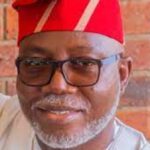The Lagos State government has expressed deep dissatisfaction with the declining performance of students in state-owned schools in the Senior School Certificate Examinations (SSCE) conducted by the West African Examinations Council (WAEC) and the National Examinations Council (NECO). It has challenged school principals, their deputies, and students to be more committed to their responsibilities.
The Commissioner for Basic and Secondary Education, Mr Jamiu Alli-Balogun, raised this concern on Thursday during the ministerial press briefing organised by the state government to commemorate the second anniversary of Governor Babajide Sanwo-Olu’s second term in office.
The Commissioner for Information and Strategy, Mr Gbenga Omotosho, represented by the Permanent Secretary of the ministry, Mr Olumide Sogunle, SSA to the Governor on Media, Mr Gboyega Akosile, and top officials from the state ministry of education and its agencies, including SUBEB, LASTVEB, and TESCOM, were all in attendance.
According to Mr Alli-Balogun, the students’ performance in external exams, particularly the last school-based WASSCE, did not justify the significant resources the state government has invested in education. He noted that the Lagos State government, as part of its free education policy at primary and secondary school levels, pays the registration fees for all SS3 students in state-owned schools to sit for WAEC exams annually, at a considerable cost.
He revealed that the state government paid N1.58 billion to WAEC for 58,188 public school students for last year’s May/June school-based exams. For this year’s edition, which commenced nationwide on Thursday, the state government has registered 56,134 students.
The Commissioner emphasised that the state government expects school leadership and students to improve their performance in external exams, rather than continue the recent trend of decline. He disclosed that only about 47 per cent of students who sat the exam last year passed in five compulsory subjects, including English Language and Mathematics—a result deemed unacceptable by the state government.
To address this issue, Mr Alli-Balogun outlined measures aimed at reversing the trend. He stated that only SS2 students who are academically capable of sitting for SSCE will now be promoted to SS3 and registered for the May/June exams, while automatic promotion to the terminal class will no longer be allowed.
He added, “Principals and vice principals will now be included in school timetables, teaching students for six and eight subject periods weekly, respectively, in addition to their administrative duties.”
The Commissioner also explained that the Office of Education Quality Assurance under the ministry has been tasked with reporting cases of truancy, sexual harassment, absenteeism, negligence of duty, and other inappropriate practices by teachers for appropriate sanctions.
Principals have been directed to revive various extracurricular activities, including sports, school debates, quizzes, arts, and music, to enhance students’ learning abilities and stimulate their physical and mental well-being. These measures are expected to promote healthy competition and improve performance in public exams, thereby raising the overall standard of education in the state.
Highlighting achievements over the past year, Mr Alli-Balogun noted that 17 new schools—two primary, 10 junior, and five senior secondary schools—were established across the state. Additionally, 242 new private schools, ranging from nursery to senior secondary levels, were granted provisional licences by the state government.
He stated that the government had upgraded most school infrastructure, including classrooms, staff rooms, libraries, laboratories, ICT rooms, and toilet facilities, and provided new ones where necessary across the six educational districts of the state. Furthermore, 4,353 teachers were recruited to ensure effective teaching and learning.
The Commissioner reaffirmed that the provision of quality education at basic and secondary levels remains a top priority for Governor Sanwo-Olu’s administration. He emphasised that the governor and his team believe access to quality education is essential for escaping ignorance and poverty and achieving a better quality of life.
He assured that the state government is committed to ensuring no child of school-going age is left behind in its mission to make basic and secondary education in Lagos State meet global standards.
ALSO READ FROM NIGERIAN TRIBUNE






